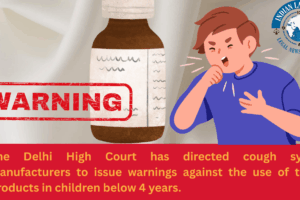Introduction
Food safety is a vital issue affecting human rights therefore, its safety too is important. It is considered any food article, which is dangerous to human life, is in violation of article 21[1] read with article 47[2] of the Constitution of India[3]. The Food Safety and Standards Authority of India (“FSSAI”) has been established under Food Safety and Standards Act, 2006 (“Act”). FSSAI has been created for laying down science-based standards for safety of food articles and to regulate their manufacture, storage, distribution, sale and import to ensure availability of safe and wholesome food for human consumption. The food regulator’s nod about food safety seems to have assumed more importance in the wake of the pan-India recall of Nestlé’s Maggi [4] in June 2015. FSSAI was tasked with enforcement of the Food Safety and Standards Act, 2006 however, the Maggie debate has raised questions on the role of a regulator in assuring enjoyment of right to life and personal liberty guaranteed under Article 21 of the Constitution of India. It seems that Maggi is not the sole food product that doesn’t stand up to the food quality standards that are enforced by the FSSAI. As per the data available on FSSAI’s website, on April 30, 2015, the statutory body has rejected more than 400 food products and deemed them unsafe for consumption. The article analyses the various issues raised in the litigations against the functioning of the FSSAI under the Act in wake of any such issue.
A. Role and Responsibility of the Regulator of Food Safety
The Act intends to consolidate the interest of consumers and manufacturers. With the coming into force of the 2006 Act, different food laws were repealed as all concerns were compiled under one umbrella Act. The repealed Acts include:
- The Prevention of Food Adulteration Act, 1954 (37 of 1954)
- The Fruit Products Order, 1955.
- The Meat Food Products Order, 1973
- The Vegetable Oil Products (Control) Order, 1947
- The Edible Oils Packaging (Regulation) Order, 1998.
- The Solvent Extracted Oil, De oiled Meal, and Edible Flour (Control) Order, 1967
- The Milk and Milk Products Order, 1992
- Any other order issued under the Essential Commodities Act, 1955 (10 of 1955)
The 2006 Act also mandates the constitution of regulatory body for maintaining food safety standards in India. The role of any regulator body cannot be read in isolation but in view that between people’s health and safety of life stands a watchdog carrying its function to uphold the fundamental rights of each and every individual. Food safety vest in the hands of FSSAI, which has been mandated by the 2006 Act for performing the following functions:
- Framing of Regulations to lay down the standards and guidelines in relation to articles of food and specifying appropriate system of enforcing various standards thus notified.
- Laying down mechanisms and guidelines for accreditation of certification bodies engaged in certification of food safety management system for food businesses.
- Laying down procedure and guidelines for accreditation of laboratories and notification of the accredited laboratories.
- To provide scientific advice and technical support to Central Government and State Governments in the matters of framing the policy and rules in areas which have a direct or indirect bearing of food safety and nutrition .
- Data Collection regarding food consumption, incidence and prevalence of biological risk, contaminants in food, residues of various, contaminants in foods products, identification of emerging risks and introduction of rapid alert system.
- Creating an information network across the country so that the public, consumers, Panchayats etc receive rapid, reliable and objective information about food safety and issues of concern.
- Provide training programmes for persons who are involved or intend to get involved in food businesses.
- Contribute to the development of international technical standards for food, sanitary and phyto-sanitary standards.
- Promote general awareness about food safety and food standards.
B. Judgments challenging the role of Regulator and the validity of the Act
(i) Maggie Dispute
Maggie, a Nestle product, was scrutinized by the FSSAI, facing legal consequences for impermissible levels of monosodium glutamate (“MSG”) and lead in the noodles. FSSAI held Maggi accountable on the following grounds:
- Excessive lead content: The maximum permitted amount of lead can be 0.25%, but the samples had 1.72%, making them unsafe and unfit for human consumption.
- Mislabeled products: Maggi labeled its packs with ‘No added MSG’, which mislead customers as the tests showed presence of MSG.
- Non-authorization: Maggi Oats masala noodles with tastemaker was launched in the market without product approval by the FSSAI.
Mumbai High Court in M/s Nestle India vs. FSSAI[5] after examining all the submissions, the following judgment have been passed as recourse for Nestle going forward:
- The 9 variants of the Maggie Noodles available with Petitioner would be tested.
- 5 samples out of each batch in their possession is to be sent to three Food Laboratories accredited and recognized by the NABL, being Vimla Lab. (Hyderbad), Punjab Biotechnology Incubator, Agri & Food Testing Laboratory (Mohali) and CEG Test House and Research Centre Pvt. Ltd.(Jaipur).
- If results show that lead in these samples is within the permissible limits, then the Company may be permitted to start its manufacturing process.
- However, even newly manufactured products of all the other variants shall be tested in the 3 laboratories above named and if the level of lead in these newly manufactured products is also within the permissible limits then the Company may be permitted to sell its products.
- Maggi Oats Masala Noodles with Tastemaker: It will have to undergo the procedure of obtaining the product approval, before it can be sold in the market.
- Additionally, the company should delete the declaration “No Added MSG” from its pack, hence no prejudice would be caused to the public at large and the allegation that product is misbranded also will not survive.
Additionally, a class action suit against Maggie is also pending before the National Commission.
(ii) Other important Judgments
Other important development in legal field on subject are three connected writ petitions filed before Mumbai High Court are worth mentioning titled the Association of the Traders carrying the Food Business of various Food items being an registered Association vs. Union of India[6] in which a prayer is made seeking a writ of mandamus[7] to quash and set aside the provisions of Section 31[8] and 36[9] and other connected sections of the FSS Act as violative of Article 14, 19 and 21 of the Constitution of India.
The second writ petition filed by Mumbai Mewa Masala Merchants Association[10], a registered Association under the provisions of the Societies Registration Act, 1860. The challenge as raised is to the substantive provisions of the FSS Act, there is also a challenge to the certain provisions under the Licensing Regulations. The challenge is basically to the legality of the provisions of Sections 31(License and Registration Food Business), 34 (Emergency Prohibition Notices and Orders), 38 (Powers of Food Safety Officer), 46 (Functions of Food Analyst), 65 (Compensation in Case of Injury of Death of Consumer), 70 (Establishment of Food Safety Appellate Tribunal) and 80 (Defenses which may or may not be allowed in prosecution under the Act) of the FSS Act.
The third Writ Petition is filed by one AHAR Indian Hotel and Restaurant Association[11]. It claims to be an Association of restaurants and hotel owners in and around Mumbai and other parts of the State of Maharashtra, registered under the Societies Registration Act, 1860. The petitioners in this petition pray that the FSS Act and the Rules and Regulations, 2011 framed thereunder be declared as illegal and unconstitutional, null and void, qua the food service providers i.e. hotels and restaurants, and, in the alternative that the FSS Act and Rules and Regulations framed thereunder are mainly framed and/or applicable to the manufacturing units / factories and not to the hotels and restaurants providing food services to its customers. Relevant Prayer clause was that this Hon’ble Court be pleased to issue a writ of Mandamus or a writ in the nature of certiorari or any other appropriate writ, order or direct the Respondents;
(i) Not to consider Hotels and Restaurants as manufacturers as defined u/Section 3(zd) of FSS Act.
(ii) To direct the Respondent No.5 to provide for representation from the Hotels and Restaurants in Central Advisory Committee.
(iii) To direct the Respondents to clarify whether the provisions of Section 16 are applicable to the Hotels and Restaurants.
(iv) To direct the Respondents to create separate category of Hotels and Restaurants in FSS Act.
(v) To direct the Respondents to frame separate & specify Rules and Regulation for Food Service Provides.
The Court held that the provisions as impugned in these writ petitions are legal, valid and intra vires Articles 14 and 19 (1) (g) of the Constitution of India and thus the challenge as raised in these Writ Petitions fails however the following observations regarding the connected petitions are worth mentioning:
(i) Legislative Intent: A detailed examination of the scheme of the FSS Act reveals the legislative intent was to include every possible aspect regarding manufacture, processing of foods, distribution of food articles, its ultimate sale and import to ensure safe and wholesome food. The statement of objects and reasons referred is of assistance to appreciate the legislative intent underlying each of these provisions in interpreting these provisions and to ascertain the object as sought to be achieved.
(ii) Right to Safe Food: It is quite clear that multiple laws on Food, which were prevailing, stand repealed by this enactment. The Parliament in exercise of its legislative powers as conferred in entry 18 of List III has enacted the FSS Act in the interest of Public Health and to safeguard the constitutional guarantee to the citizens as conferred under the provisions of Article 21 of the Constitution, from the perspective of human health and consumption of food being a necessary concomitant of this fundamental right. This Act is a successor to the provisions of the Prevention of Food Adulteration Act, which stood repealed by the FSS Act.
(iii) Absolute Liability for Infringement not Contrary to Law: Referring to the decision of the Supreme Court in the case of “Andhra Pradesh Grain and Seed Merchants Association Vs. Union of India[12],wherein the Supreme Court considered a challenge to the validity of Section 7 read with Section 2(v) and2(ix) and Section 19(2)(i) and Section 10 read with Section 13 of the Prevention of Food Adulteration Act,1954 and the rules framed thereunder challenged on the ground that they are violative of fundamental rights guaranteed under Article 14, 19(1) (g) and 20(3) of the Constitution. The following relevant para needs attention of the readers here too:
“6. But in considering whether creation of absolute liability amounts to imposing unreasonable restrictions, the Court has to strike a balance between the individual right and public weal. The Courts will not strike down an Act as imposing unreasonable restrictions merely because it creates an absolute liability for infringement of the law which involves grave danger to public health. The Courts will undoubtedly consider whether without imposing absolute liability the object of the statute could be reasonably secured. For that purpose the Court will consider the object of, the Act, apprehended danger to the public interest, arising out of the activity if not controlled and the, possibility of achieving the intended results by less stringent provisions.”
“7. It is true that for the protection of the liberty of the citizen, in the definition of offences, blameworthy mental condition is ordinarily an ingredient either by express enactment or clear implication: but in Acts enacted to deal with a grave social evil, or for ensuring public welfare, especially in offences against public health, e.g., statutes regulating storage or sale of articles of food and drink, sale of drugs, sale of controlled or scare commodities, it is often found necessary in the larger public interest to provide for imposition of liability without proof of a guilty mind.”
(iv) Observations in Litigation of Harmful Effects of Soft Drinks: Referring to the recent decision of the Supreme Court in the case of “Centre for Public Interest Litigation Vs. Union of India & Ors[13]. In the context of an issue dealing with the harmful effect of soft drinks on human health and in considering the provisions of FSS Act on various principles of food safety as enshrined in Section 18 and other provisions of the Act, the Supreme Court has held that a paramount duty is cast on the States and its authorities to achieve an appropriate level of protection to human life and health which is a fundamental right guaranteed to the citizens under Article 21 read with Article 47 of the Constitution of India. It is thus clear from the enunciation of the above legal principles as laid down by the Supreme Court that it is not only a statutory requirement for the food Authorities to have a regime of making available safe food products to the consumer but it is a constitutional requirement emanating from the provisions of Article 21 read with Article 39 and 47 of the Constitution of India.
(v) Ordinary Meaning of Section 31 of the Act: The Hon’ble Court also observed that after perusal of Section 31 of the FSS Act reveals that it is a licensing provision, which requires that no person shall commence or carry on any food business except under a licence. “Food business” is defined under Section 3(n) of the Act to mean any undertaking, whether for profit or not and whether public or private, carrying out any of the activities related to any stage of manufacture, processing, packaging, storage, transportation, distribution of food, import and includes food services, catering services, sale of food or food ingredients. Similarly “unsafe food” is defined under Section 3(zz) to mean an article of food whose nature, substance or quality is so affected as to render it injurious to health. As to how it is rendered injurious to health has been explained in clauses (i) to (xii) as contained in sub-section (zz) of Section 3 of the Act. A plain reading of Section 31 when seen in the context of grant of a licence or registration of food business, the court found that in its opinion, it does not indicate that it creates any ambiguity. The meaning, which is attributed to the various words used in Section 31 read with the words in the definition clause do not create any vagueness so as to render Section 31 vague or in-operational. This is for the reason that the words as used in the provision are required to be read in the context of the Act. The legislation as a whole is required to be considered to ascertain the meaning of the terms and expression as used in the legislation. Thus, the words contained in the definition clause are required to be understood in the light of the other provisions of the Act and with due regard to the ordinary connotation of the words defined and not in isolation as sought to be contended by the petitioners. Moreover, to give effect to the licensing provision under Section 31 the Food Authority has framed regulations namely the Food Safety and Standards (Licensing and registration of food businesses) Regulations, 2011 (for short “the licensing regulations’) in exercise of powers conferred under clause (o) of sub section (2) of Section 92 read with Section 31 of Food Safety Act. A perusal of these licensing regulations would demonstrate that submissions not well founded.
Perusal of the Licensing regulations show that the licensing / registering Authority would grant license and registration only on the compliance by the applicant to the Safety Regulations as mentioned in Schedule 4. Schedule 4 pertains to General Hygienic and Sanitary practices to be followed by Food Business operators. The provisions of Schedule 4 are extensive which pertain to general hygienic and sanitary practices followed by the food business operators, food manufacturer, processor, handler, sanitary and hygienic requirements for street food vendors and units other than manufacturing/processing, general requirements on hygienic and sanitary practices to be followed by all Food Business Operators applying for a license, engaged in manufacture, processing, storing and selling of Milk and Milk Products, engaged in manufacture, processing, storing and selling of Meat and Meat Products, engaged in catering / food service establishments, personal hygiene, transportation and handling of food, storage, special requirements for high risk foods such as cut fruits/salads, fresh juices and beverages etc. A perusal of the extensive nature of these licensing regulations and intricate facets. It takes into consideration, would show that there is no ambiguity or vagueness as being canvassed on behalf of the petitioners. Looking at these provisions we are not at all impressed with the submissions made.
(vi) Dispute regarding the Designated Officer under the Act: A perusal of Section 31 read with Rule 2.1.2 of the Food Safety and Standards Regulations, 2011 clearly indicate that the Designated Officer is not a Revenue Officer as urged by the petitioners. Furthermore, the Act and Rules appropriately provide for all the safeguards as necessary for the Designated Officer to perform various duties and powers conferred on him. The challenge by the petitioner is thus, wholly unfounded and accordingly deserves to be rejected. We note that section 32 is a comprehensive provision. This provision as it pertains to suspension and cancellation of licence is undoubtedly required to be read with the Licencing Regulations, 2011 which is clear from a reading of Section 32. In our opinion, in the administration of the FSS Act, unless the Designated Officer is provided with such powers the administration of the Act would become difficult when the Act intends to achieve an object directly affecting human life. The object of these provisions is therefore, laudable.
(vii) Dispute regarding Provisions relating to the Compensation in case of Injury or death of a Consumer: The provisions assailed are section 65(1) which pertains to compensation in case of an injury or death to a consumer. A perusal of this provision clearly indicates that the provision begins by following words:-“Without prejudice to other provisions of this Chapter, if any person whether by himself or by any other person on his behalf manufactures or distributes or sells or imports any article of food causing injury to the consumer or his death, it shall be lawful for the Adjudicating Officer or as the case may be, the Court to direct him to pay compensation.” The provision is required to be read in its entirety and alongwith the other provisions of the FSS Act. The word ‘manufacturer‘ as used in this provision in a given situation would take within its ambit any producer of a food item on whom there is an obligation to comply with the provisions of the Act, rules and regulations made under it. If it is found that such a producer or manufacturer is guilty of dealing with food which has caused death of a person, then only for the reason that the word ‘producer‘ has not been used in the provision cannot be construed that such a person can escape the liability and consequences under this provision. Thus, the contention that as the word ‘producer’ is not incorporated in Section 65 (1), it would render Section 65(1) illegal or unconstitutional is without any merit.
(viii) Regarding the third writ petition: The court held that the legislature has carefully incorporated various provisions providing for penalty with an object of securing safe food for human consumption and has attempted to establish standards for those who are dealing in business of food. These are provisions, which are enshrined under Articles 21, and 47 of the Constitution of India as held by the Supreme Court. Each of the provisions, which are assailed by the petitioners, is intended to achieve these constitutional objects. Thus, an imaginary challenge is sought to be raised which in any case ought to fail. The Petitioners have not come out with any case that the respondents in any manner have restricted the use of any food item in its natural form which is unadulterated not injurious to health and have made a rule prohibitive of such use. Reliance on the observations of the Supreme Court in paragraph 55 therefore, are squarely inapplicable to the facts of the present case. Counsel for the petitioners has placed reliance on the decisions of the Supreme Court in the case of Academy of Nutrition Improvement & ors vs Union of India[14], in support of his submissions that the terms like processing, storage, distribution, food service, catering, food ingredients which are not defined under the Act have created an ambiguity and vagueness in the implementation of the provisions of the Act. We may observe that the FSS Act has been enacted for the benefit and welfare of the citizens and has direct nexus to the right to life as enshrined under Article 21 of the Constitution. This is a social legislation and provides for solution to the problems which would be a creation of nobody else but the members of the society. In upholding the validity of the provisions of the FSS Act, we have adopted the principles of interpretation which would further the social interest and the object of the legislation. As a Constitution Court, we cannot loose sight of the evil, which is sought to be remedied by this enactment. The mischief which is sought to be remedied is nothing but sheer creation of we humans who have the tendency to indulge and deal in food products which would not be safe for human consumption and/or likely to cause a grave impact on human health. Every person even the person dealing in such unsafe food is likely to be the victims. We may observe that it would be the fundamental duty of every citizen to nurture such morals, ideals, qualities, habits and discipline so as to bring about a situation that the indulgence and dealing in hazardous and unsafe food is eliminated in totality as a matter of social responsibility of every citizen and bring about a situation that penal actions under these social legislation are minimized sheerly by inculcating these virtues of honesty and morality in dealing with food as a duty towards every citizen and this Country. These are the principles which are enshrined as one of the fundamental duties in Article 51 A sub-clauses (h)[15] and (j)[16] of the Constitution.
C. Litigation in Repealed Food Adulteration Act over Similar Issues
The legislative power of the Parliament in enacting Prevention of Food Adulteration Act was also in Entry 18 in List III of the Constitution. A challenge to this Act was considered by the Constitution Bench of the Supreme Court in the case of State of Uttar Pradesh Vs. Kartar Singh, (AIR 1964 SC 1135). The case concerned the prosecution faced by the respondent Kartar Singh of an offence under Section 7 read with Section 16(1)(a)(i) of the Prevention of Food Adulteration Act,1954. Mr.Kartar Singh was conducting a shop. The Food Inspector purchased some quantities of ghee. The sample of the Ghee was sent for analysis. The public analyst expressed an opinion that the sample contained small proportion of vegetable fat or oil foreign to pure ghee. The Medical Officer of Health sanctioned the prosecution against Kartar Singh and a complaint was lodged before the Magistrate First Class by the Food Inspector. Kartar Singh pleaded not guilty and entered a defence. The defence was that it was not adulterated and that he had obtained ghee which has sold from Jodhpur. The requirement of such additive in Jodhpur was different. The Magistrate, however, did not accept the defence and sentenced him to R.I. for a period of six months and fine of Rs.500/-. In the appeal the Sessions Judge confirmed the findings of the Magistrate, however, while upholding the conviction reduced the sentence of imprisonment from six months to one month and fine of Rs.200/-. In a criminal revision petition before the High Court under Section 435 and 439 of Cr.P.C. 1898, the learned Judge of the High Court disagreed with the Courts below on finding of facts based on the standards of ghee in Jodhpur Region. As different standards were prescribed at Jodhpur, the High Court held that the respondent was not guilty of adulteration and directed his acquittal. It was this decision of the High Court which was in appeal before the Supreme Court. A challenge was raised in regard to the standards prescribed under the Food Adulteration Act violates Article 14. The Supreme Court set aside the decision of the High Court and restored the sentence of conviction of one month as imposed by the Sessions Court. While examining the provisions of the Prevention of Food Adulteration Act, the Supreme Court in paragraphs 15 and 16 has observed thus:-
“15. The standards themselves, it would be noticed, have been prescribed by the Central Government on the advice of a Committee which included in its composition persons considered experts in the field of food technology and food analysis. In the circumstances, if the rule has to be struck down as imposing unreasonable or discriminatory standards, it could not be done merely on any a priori reasoning but only as a result of materials placed before the Court by way of scientific analysis. It is obvious that this can be done only when the party invoking the protection of Art. 14 makes averments with details to sustain such a plea and leads evidence to establish his allegations. That where a party seeks to impeach the validity of a rule made by a competent authority on the ground that the rules offend Art. 14 the burden is on him to plead and prove the infirmity is too well established to need elaboration”.
Conclusion
It is well settled that there is no fundamental right to do business in adulterated or unsafe food. There cannot be any complaint on the part of the petitioners that they have a legal right to deal in food which is not safe or which is manufactured or dealt with or is made available for human consumption contrary to the norms which are set down under rules and regulation as framed under the Food Safety Act. Such argument cannot be countenanced. If an interpretation as being canvassed on behalf of the petitioner is accepted, the consequences is nothing but a grave violence to the salutary provisions and norms which are sought to be brought about and implemented by the authorities under the FSS Act for the betterment of human life. Thus, any Maggie debate should not raise issues of why Maggie alone be singled out or be resolved by filing litigations against the regulator or on Constitutional Status of an Act but should inspire the companies burdened with Corporate Social responsibility under law or otherwise to remember this is an era of doing business with responsibility alone.
[1] Protection of life and personal liberty No person shall be deprived of his life or personal liberty except according to procedure established by law
[2] Duty of the State to raise the level of the nutrition and standard of living and to improve public health
[3] Centre for Public Interest Litigation vs.UOI AIR 2014 SC 49
[4] The regulator termed the noodles “hazardous for human consumption”, owing to the presence of monosodium glutamate and excessive lead in it.
[5] Writ Petition 1688 of 2015 (Mumbai High Court)
[6] Writ Petition no.477 OF 2012, Mumbai High Court
[7] Mandamus is a judicial remedy in the form of an order from a superior court,[1] to any government subordinate court, corporation or public authority to do (or forbear from doing) some specific act which that body is obliged under law to do (or refrain from doing) and which is in the nature of public duty, and in certain cases one of a statutory duty.
[8] Provision of licensing and registration of food business
[9] Provisions relating to designated officers
[10] Writ Petition No.227 of 2012 (Mumbai High Court)
[11] Writ Petition No.227 of 2012 (Mumbai High Court)
[12] AIR 1971 SC 2346
[13] AIR 2014 SC 49
[14] (2011 (8) SCC 274)
[15] It shall be the duty of every citizen of India to develop the scientific temper, humanism and the spirit of inquiry and reform;
[16] It shall be duty of every citizen to strive towards excellence in all spheres of individual and collective activity so that the nation constantly rises to higher levels of endeavour and achievement












